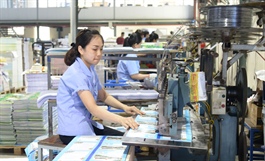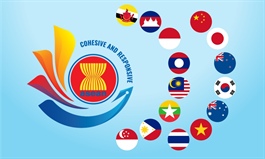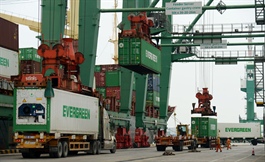IMF raises Vietnam GDP forecast to 2.4% in 2020, among world’s highest
IMF raises Vietnam GDP forecast to 2.4% in 2020, among world’s highest
Vietnam’s growth is projected to strengthen further to 6.5% as normalization of domestic and foreign economic activity continues, stated the IMF.
Thanks to Vietnam’s swift actions to contain the health and economic fallout of Covid-19, the International Monetary Fund (IMF) has revised up the country's growth this year to 2.4%, among the highest in the world, from its previous forecast of 1.6%.

IMF expects Vietnam's strong economic recovery in 2021. Photo: Pham Hung.
|
The finding was revealed following a virtual mission from an IMF team led by Era Dabla Norris during October 15 – November 13, to conduct discussions for the 2020 Article IV consultation with Vietnam.
The team exchanged views with senior officials of the State Bank of Vietnam (SBV), the Ministry of Finance (MOF), the Central Economic Commission (CEC), the Ministry of Planning and Investment (MPI) and other government agencies. It also met with representatives from the private sector, think tanks, academia and financial institutions.
“The fiscal response has been largely geared towards supporting vulnerable households and firms and has benefited from prudent policies adopted in the past. Monetary policy easing and temporary financial relief measures by the SBV have alleviated liquidity pressures, lowered the cost of funding, and facilitated continued flow of credit,” stated Norris at a statement.
“A strong recovery is expected in 2021. Growth is projected to strengthen further to 6.5% as normalization of domestic and foreign economic activity continues,” Norris noted.
“Fiscal and monetary policies are expected to remain supportive, although to a lesser extent than in 2020. Inflation is expected to remain close to the authorities’ target at 4%,” she added.
Fiscal support should be extended into 2021
Nevertheless, the outlook is subject to substantial uncertainties stemming from possible renewed outbreaks, a protracted global recovery, ongoing trade tensions, and corporate distress, which could translate into firm closures and bankruptcies, labor market and banking system strains, the head of the IMF team asserted.
Given these uncertainties, flexibly adjusting the size and composition of the policy support will be important. Fiscal policy should play a larger role in the policy mix, Norris asserted.
According to Ms. Norris, this year, the fiscal deficit is expected to widen due to a decline in revenues and higher cash transfers and capital spending. Fiscal support should be maintained in 2021, with improving efficiency in execution as priority. Over the medium-term, the emphasis should be on mobilizing revenue for financing green and productive infrastructure, strengthening social protection systems, and safeguarding debt sustainability.
Moreover, monetary policy should remain supportive in the near term. Greater two-way exchange rate flexibility within the current framework would reduce the need to build reserve buffers and facilitate the adjustment to a potentially more challenging external environment.
“The mission welcomes the authorities’ commitment to gradually modernize its policy frameworks,” she added.
The IMF said the SBV has struck an appropriate balance between supporting the recovery and banking system resilience. Close monitoring of risks in the banking sector remains crucial given that capital buffers are weaker than regional peers and uncertainties associated with the outlook.
Non-performing loan (NPL) recognition and loan classification rules should be gradually normalized to support balance sheet transparency and confidence in the banking system. Banks’ capital positions need to be further strengthened and capital markets developed to improve financial resilience and promote long-term financing.
The IMF also noted reforms is essential to reduce economic dualism between the domestic and FDI sectors and lift productivity are crucial to support robust and inclusive growth.
Additionally, continued efforts to remove structural distortions and improve the business climate are welcome.
Priority should be given to reducing the regulatory burden faced by domestic private firms, improving access to land and financial resources, particularly for SMEs, and reducing corruption. Establishing an expedited SME-specific insolvency regime would help unlock capital and prevent unnecessary liquidations. Reducing labor skill mismatches, increasing human capital and technology access would also boost labor productivity.






















